Find Help
More Items From Ergsy search
-

Endometrial Cancer
Relevance: 100%
-

Endometrial Cancer
Relevance: 100%
-

Endometrial Cancer
Relevance: 98%
-
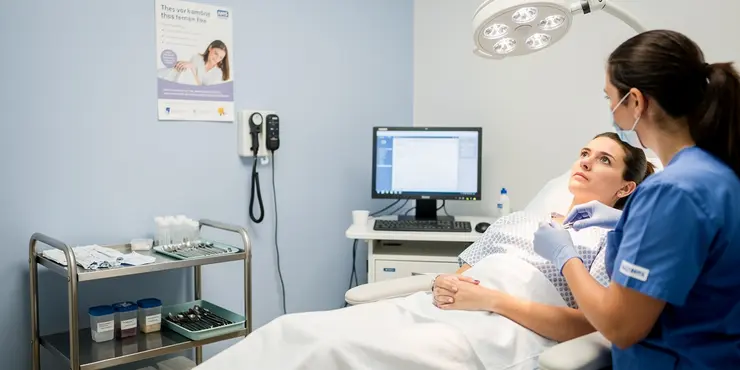
Can a womb lining test detect cancer?
Relevance: 54%
-

Can a womb lining test detect cancer?
Relevance: 46%
-

Taking a Genetic Family History - The Conversation (Bowel Cancer)
Relevance: 33%
-

What is Cancer?
Relevance: 30%
-

Vaginal Cancer
Relevance: 30%
-

Ovarian Cancer
Relevance: 30%
-

Vulval Cancer
Relevance: 30%
-

Why might someone need a womb lining test?
Relevance: 30%
-

Why is a womb lining test performed?
Relevance: 30%
-

What is the difference between colon cancer and rectal cancer?
Relevance: 30%
-

What is cancer screening?
Relevance: 29%
-
What is testicular cancer?
Relevance: 29%
-

What is colorectal cancer?
Relevance: 29%
-
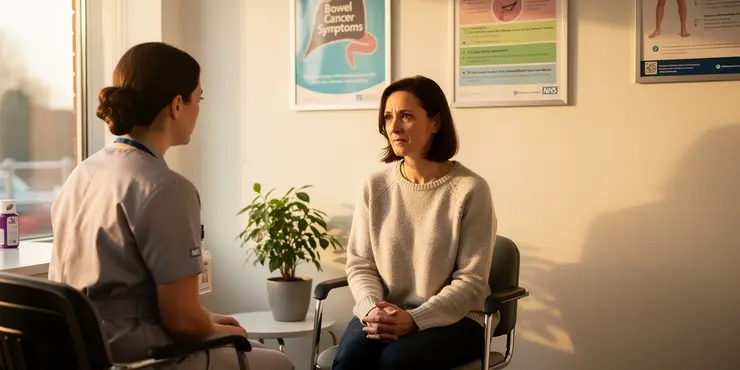
What is Bowel Cancer?
Relevance: 29%
-

Treating prostate cancer
Relevance: 29%
-

Mouth Cancer Awareness
Relevance: 29%
-

What is testicular cancer?
Relevance: 29%
-

What is Prostate Cancer?
Relevance: 29%
-

What is testicular cancer?
Relevance: 29%
-

Is testicular cancer treatable?
Relevance: 29%
-
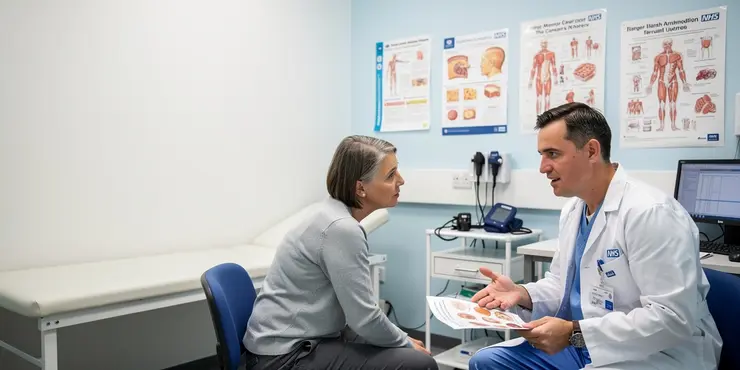
Skin cancer education
Relevance: 29%
-
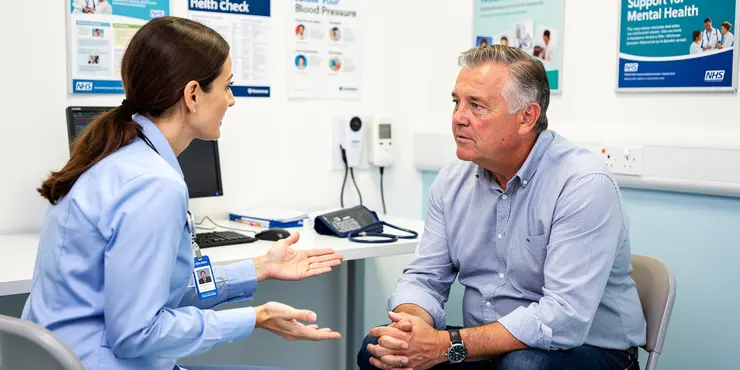
Living with prostate cancer
Relevance: 29%
-

What is Pancreatic Cancer?
Relevance: 29%
-
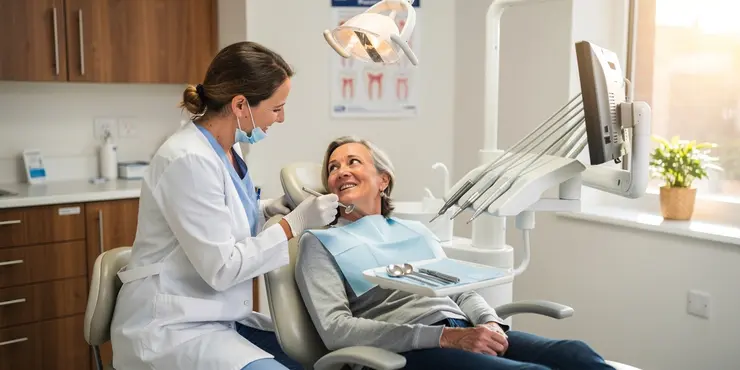
Mouth Cancer Infomercial
Relevance: 29%
-

Skin Cancer - How do I check if my mole is skin cancer? | NHS
Relevance: 28%
-
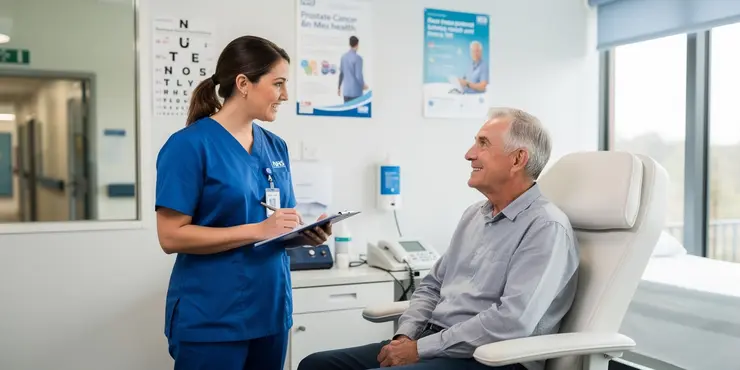
Breakthrough in Cancer Treatment Offers Hope for Prostate Cancer Patients
Relevance: 28%
-

AI Breast Cancer Screening in the UK
Relevance: 28%
-
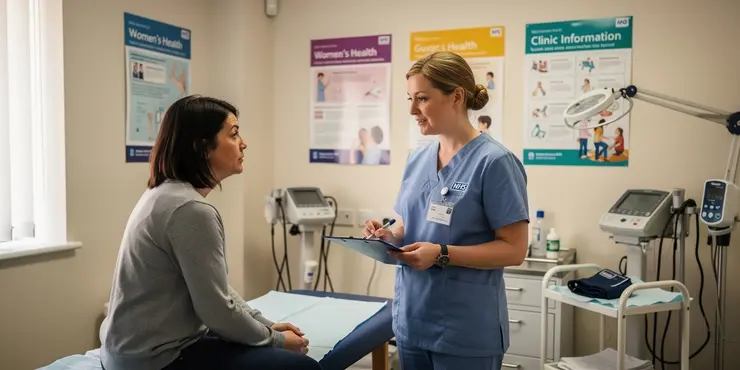
What is the womb lining test?
Relevance: 28%
-

How common is testicular cancer?
Relevance: 28%
-

What causes testicular cancer?
Relevance: 28%
-
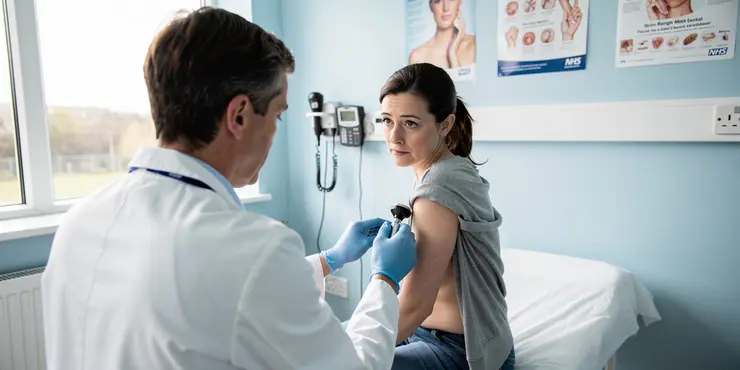
What is a skin cancer screening?
Relevance: 28%
-

What is the Womb Lining test?
Relevance: 28%
-

Raising awareness of ovarian cancer
Relevance: 28%
-

What are the stages of testicular cancer?
Relevance: 28%
-

How is prostate cancer treated?
Relevance: 28%
-

Who is at risk for testicular cancer?
Relevance: 28%
-

Can HPV lead to cancer?
Relevance: 28%
What is endometrial cancer?
Endometrial cancer, also known as uterine cancer, is a type of cancer that begins in the lining of the uterus, called the endometrium. The uterus is the pear-shaped organ in a woman's pelvis where a baby grows during pregnancy.
Here are some key points about endometrial cancer:
- Causes: The exact cause of endometrial cancer is not fully understood, but it is believed to be related to changes in the DNA of cells in the endometrium, leading to uncontrolled growth and the formation of tumors. Risk factors for endometrial cancer include hormonal imbalances (such as excess estrogen), obesity, age (most commonly diagnosed in postmenopausal women), diabetes, certain genetic conditions (such as Lynch syndrome), and a history of endometrial hyperplasia or previous pelvic radiation therapy.
- Symptoms: Endometrial cancer may cause symptoms such as abnormal vaginal bleeding (including postmenopausal bleeding or bleeding between periods), pelvic pain or discomfort, pain during intercourse, and changes in bowel or urinary habits. However, in some cases, endometrial cancer may cause no symptoms, especially in the early stages.
- Diagnosis: The diagnosis of endometrial cancer typically involves a combination of medical history, physical examination, imaging tests (such as transvaginal ultrasound), and diagnostic procedures (such as endometrial biopsy or dilation and curettage) to obtain a tissue sample from the lining of the uterus for examination under a microscope.
- Staging: Endometrial cancer is staged based on the extent of the disease, including the size of the tumor, whether it has spread to nearby tissues or lymph nodes, and whether it has metastasized (spread) to distant organs. Staging helps guide treatment decisions and prognosis.
- Treatment: Treatment for endometrial cancer depends on the stage and characteristics of the tumor, as well as the patient's overall health and preferences. Treatment options may include surgery (such as hysterectomy or removal of nearby lymph nodes), radiation therapy, chemotherapy, hormone therapy, or targeted therapy. The goal of treatment is to remove or destroy cancerous cells and prevent recurrence.
- Prognosis: The prognosis for endometrial cancer varies depending on factors such as the stage of the disease, tumor grade, and response to treatment. Endometrial cancer diagnosed at an early stage (confined to the uterus) generally has a more favorable prognosis, with high survival rates. However, advanced or recurrent endometrial cancer may be more challenging to treat and may have a poorer prognosis.
Regular pelvic exams, Pap smears, and discussions with a healthcare provider can help detect endometrial cancer early when it is most treatable. If you experience any symptoms suggestive of endometrial cancer, it's essential to seek prompt medical evaluation for proper diagnosis and treatment.
Understanding Endometrial Cancer
What is Endometrial Cancer?
Endometrial cancer is a type of cancer that begins in the lining of the uterus, known as the endometrium. It is the most common type of uterine cancer and typically affects postmenopausal women, though it can occur in younger women as well. This type of cancer is often detected at an early stage because it frequently causes abnormal vaginal bleeding, prompting women to seek medical attention.
Risk Factors
Several factors can increase the risk of developing endometrial cancer. These include:
- Age: The risk increases as a woman gets older, particularly after menopause.
- Obesity: Excess body fat can lead to higher levels of estrogen, which is linked to endometrial cancer.
- Hormonal Imbalance: Conditions that cause increased estrogen, such as polycystic ovary syndrome (PCOS) or hormone replacement therapy without the use of progesterone, can elevate risk.
- Family History: A history of endometrial or colorectal cancer in the family can increase susceptibility.
- Diet and Lifestyle: High-fat diets and lack of physical activity are also contributing factors.
Symptoms
Common symptoms of endometrial cancer include:
- Abnormal vaginal bleeding or discharge, especially postmenopausal bleeding
- Pelvic pain or pressure
- Pain during intercourse
- Unintended weight loss
These symptoms can be associated with other conditions as well, so it's important to consult a healthcare professional for an accurate diagnosis.
Diagnosis and Treatment
Diagnosis typically involves a pelvic examination, ultrasound, and biopsy of the endometrial tissue. If cancer is detected, additional imaging tests may be conducted to determine the cancer's stage.
Treatment options depend on the stage and extent of the cancer and may include:
- Surgery: The most common treatment is the surgical removal of the uterus (hysterectomy), sometimes including the removal of the ovaries and fallopian tubes (salpingo-oophorectomy).
- Radiation Therapy: High-energy rays are used to target and kill cancer cells.
- Chemotherapy: The use of drugs to destroy cancer cells may be considered, especially if the cancer has spread.
- Hormone Therapy: Medications that influence hormone levels can be used to slow the growth of cancer cells that are influenced by estrogen or progesterone.
Prevention and Awareness
Maintaining a healthy weight, staying physically active, and having regular health check-ups can help reduce the risk of endometrial cancer. In the United Kingdom, organisations like Cancer Research UK and the NHS provide resources and support for those affected by endometrial cancer. Awareness and early detection are critical for effective treatment and improved outcomes.
What is endometrial cancer?
Endometrial cancer is a type of cancer. It starts inside the uterus, which is the place where a baby grows in a woman's belly. The uterus is shaped like a pear.
Here are some important things to know about endometrial cancer:
- Causes: We do not know exactly what causes endometrial cancer. It may happen because of changes in the cells inside the uterus. These changes make the cells grow too much and form lumps called tumors. Things that can make endometrial cancer more likely include having too much of a hormone called estrogen, being very overweight, being older (it often happens in women who have stopped having periods), having diabetes, some genetic problems, or having had certain treatments before.
- Symptoms: Signs of endometrial cancer can be unusual bleeding from the vagina (bleeding after periods have stopped or between periods), pain in the lower belly, pain during sex, or changes in how you go to the toilet. Sometimes you might not have any symptoms at first.
- Diagnosis: To find out if someone has endometrial cancer, doctors might ask questions, do a medical check-up, use special cameras to look inside (like an ultrasound), and take a small piece from the uterus to look at under a microscope.
- Staging: Staging means finding out how big the cancer is and if it has spread to other parts. This helps doctors decide the best way to treat it and understand how serious it is.
- Treatment: The best treatment depends on how much the cancer has spread and what it looks like. Options can be surgery to take out the uterus, using rays to kill cancer cells, medications, or other special treatments. The aim is to get rid of the cancer and stop it from coming back.
- Prognosis: Prognosis is about how well someone might do after treatment. If cancer is found early and is only in the uterus, people often have a good chance of getting better. If the cancer has spread or comes back, treatment can be harder and the chance of getting better might be less.
Going to regular doctor check-ups, getting Pap tests, and talking to a doctor can help find endometrial cancer early. Early detection makes it easier to treat. If you have any signs that might mean endometrial cancer, you should see a doctor quickly to find out more and get help.
Understanding Endometrial Cancer
What is Endometrial Cancer?
Endometrial cancer is a type of cancer that starts in the lining of the uterus, which is called the endometrium. It is the most common cancer in the uterus. It usually affects older women who have stopped having periods, but younger women can get it too. It often gets noticed early because it causes unusual bleeding. This makes many women go to the doctor.
Risk Factors
Some things can make it more likely to get endometrial cancer. These are:
- Age: The chance goes up as women get older, especially after they stop having periods.
- Obesity: Being very overweight can lead to more estrogen, a hormone that is linked to this cancer.
- Hormonal Imbalance: Some conditions, like PCOS or taking certain hormones without another hormone called progesterone, can increase the risk.
- Family History: If family members had endometrial or colorectal cancer, the risk is higher.
- Diet and Lifestyle: Eating a lot of fat and not exercising enough can also add to the risk.
Symptoms
Signs of endometrial cancer can include:
- Unusual vaginal bleeding or discharge, especially bleeding after menopause
- Pain or pressure in your lower belly
- Pain during sex
- Losing weight without trying
These signs can also be from other problems, so it is important to see a doctor to find out what's going on.
Diagnosis and Treatment
To find out if there is cancer, doctors will do a pelvic exam, an ultrasound, and take a small piece of the endometrial tissue to look at it. If there is cancer, the doctor might do more tests to see how far it has spread.
Treating the cancer will depend on how big it is and where it is in the body. Treatments might include:
- Surgery: The most common way is to remove the uterus. Sometimes the ovaries and tubes are also taken out.
- Radiation Therapy: This uses strong rays to kill cancer cells.
- Chemotherapy: Medicine is used to kill cancer cells, especially if they have spread.
- Hormone Therapy: Medicines that change hormone levels can slow the growth of cancer cells that need hormones to grow.
Prevention and Awareness
Keeping a healthy weight, being active, and going for regular health check-ups can help lower the risk of endometrial cancer. In the UK, groups like Cancer Research UK and the NHS give help and information for people with this cancer. Knowing about it and finding it early are very important for good treatment and getting better.
Frequently Asked Questions
What is endometrial cancer?
Endometrial cancer, also known as uterine cancer, starts in the lining of the uterus (endometrium). It is the most common type of cancer affecting the female reproductive organs.
What are the main symptoms of endometrial cancer?
The main symptoms of endometrial cancer include abnormal vaginal bleeding or discharge, pelvic pain, and pain during intercourse or urination.
What causes endometrial cancer?
The exact cause of endometrial cancer is not known, but risk factors include hormonal imbalances, obesity, certain inherited conditions, age, and a history of not having children.
How is endometrial cancer diagnosed?
Endometrial cancer is diagnosed through a combination of pelvic exams, ultrasound, endometrial biopsy, and sometimes imaging tests like CT scans or MRIs.
What treatments are available for endometrial cancer?
Treatments for endometrial cancer include surgery to remove the uterus (hysterectomy), radiation therapy, hormone therapy, and chemotherapy.
Can endometrial cancer be prevented?
While it may not be entirely preventable, risk can be reduced by maintaining a healthy weight, managing hormone levels, and using birth control pills if advised by a doctor.
Is endometrial cancer hereditary?
Endometrial cancer can be hereditary, especially in individuals with Lynch syndrome, a genetic condition that increases the risk of several types of cancer.
What is the survival rate for endometrial cancer?
Survival rates depend on the stage at diagnosis, with earlier stages associated with higher survival rates. On average, the 5-year survival rate is around 81%.
Who is most at risk for developing endometrial cancer?
Women who are postmenopausal, obese, have hormonal imbalances, never been pregnant, or have a family history of certain cancers are at a higher risk.
Is there a screening test for endometrial cancer?
There are no standard screening tests for endometrial cancer for women at average risk. However, women with high risk should discuss regular monitoring with their doctors.
What kind of follow-up is needed after treatment for endometrial cancer?
Follow-up usually includes regular check-ups, pelvic exams, and imaging tests to monitor for recurrence. Follow-up intervals are typically every 3-6 months for the first few years.
How does obesity increase the risk of endometrial cancer?
Obesity increases the risk due to higher levels of estrogen produced by fat tissue, which can stimulate the endometrium and lead to cancer development.
Are there any lifestyle changes that can lower the risk of endometrial cancer?
Maintaining a healthy weight, eating a balanced diet, staying physically active, and avoiding unnecessary hormone replacement therapy can help lower the risk.
Can hormone replacement therapy (HRT) affect the risk of endometrial cancer?
Yes, using estrogen alone without progesterone can increase the risk of endometrial cancer. Combined HRT (estrogen and progesterone) is less risky but still needs careful consideration and monitoring.
What support is available for women with endometrial cancer in the UK?
Support is available through the NHS, Cancer Research UK, support groups, and counselling services. Specialist nurses, social workers, and online resources also provide assistance.
What is endometrial cancer?
Endometrial cancer is a kind of cancer. It starts in the lining of the uterus (womb). The lining is called the endometrium.
If you want to know more or need help, you can:
- Ask your doctor questions.
- Read books with pictures. These can help you understand better.
- Use a computer or tablet to watch videos about endometrial cancer.
Always remember, it is okay to ask for help if you do not understand something.
Endometrial cancer is also called uterine cancer. It starts in the lining inside the uterus, which is called the endometrium. This is the most common cancer that affects the female body's reproductive organs.
Here are some things that can help you understand better:
- Read Slowly: Take your time to read each word.
- Ask for Help: If you don't understand something, ask someone you trust.
- Use a Dictionary: Look up words you find hard.
- Break it Down: Break sentences into parts and understand each part.
What signs show endometrial cancer?
Endometrial cancer is a kind of cancer in a woman’s womb. Here are some signs:
- Bleeding that is not normal or heavy bleeding.
- Pain in your belly or pelvis.
- Bad discharge from the vagina.
If you notice these signs, talk to a doctor.
Tools that help read:
- Use a ruler or your finger to follow the words.
- Ask someone to read with you.
- Use audiobooks or text-to-speech apps to hear the words.
The signs of womb cancer can be:
- Bleeding from your private parts when it’s not your period.
- Strange wetness from your private parts.
- Hurting in your lower belly.
- Hurting when you pee or during sex.
What makes endometrial cancer happen?
Doctors don’t know exactly why some people get endometrial cancer. But some things can make it more likely. These include:
- Having too many hormones
- Being very overweight
- Having certain illnesses that run in families
- Getting older
- Not having any children
If you're worried, ask your doctor for help. You can also use tools like picture books or videos to learn more.
How do doctors find out if someone has endometrial cancer?
Doctors can check for endometrial cancer in a few ways. Here are some ways:
Talk with a doctor: The doctor will ask about how the person is feeling and any problems they might have.
Ultrasound: This is a special picture of the inside of the body. It helps the doctor see if there are any problems.
Biopsy: The doctor takes a small piece from inside the body to look at it closely.
It is important to tell the doctor about any tummy pain or bleeding that is not normal. This helps the doctor know what to do next.
Helpful tools:
- Bring a friend or family member to the doctor’s visit to help you remember things.
- Write down any questions before visiting the doctor.
- Use pictures and simple words if you have trouble understanding medical words.
The doctor checks for endometrial cancer by doing some tests. They might look inside with a pelvic exam, use an ultrasound, or take a small sample from inside to look at (this is called a biopsy). They might also use a special camera, like a CT scan or MRI, to take pictures inside your body.
What treatments can help with womb cancer?
If you have womb cancer, doctors can help you feel better with treatments. Here are some things that might help:
- Surgery: Doctors might do an operation to take out the cancer.
- Radiation Therapy: Special X-ray machines can kill cancer cells. This can help the body get rid of the cancer.
- Chemotherapy: Medicine can travel through your body and fight cancer cells.
- Hormone Therapy: Some medicines can block chemicals in your body to stop the cancer from growing.
It is important to talk to your doctor to find the best treatment for you. They will explain everything in a way that you understand. You can also ask someone you trust to come with you to appointments for support. Writing down questions to ask your doctor can help you remember what you want to know. You can also use simple language tools like pictures or charts to understand better.
If doctors find endometrial cancer, there are ways they can help:
- They might do an operation to take out the womb. This is called a hysterectomy.
- They might use strong lights called radiation to kill the cancer cells.
- They could use hormone medicine to help stop cancer.
- They might use special strong medicines called chemotherapy to fight cancer.
Tools like picture boards or simple drawings can help explain this. Asking a friend or family member to help you understand the doctor's talk can be good too.
Can we stop endometrial cancer from happening?
You can't stop it completely, but you can lower the risk. Stay at a healthy weight, keep your hormones balanced, and take birth control pills if your doctor says it's okay.
Can endometrial cancer run in families?
Endometrial cancer is a type of cancer that starts in the lining of the uterus (the womb). Sometimes, it can run in families, which means it can be passed down from parents to children. This is called "hereditary."
If someone in your family has had endometrial cancer, talk to a doctor. They can tell you if you need any special tests or care. Knowing about your family history can help doctors keep you healthy.
A helpful tool is to talk to a trusted adult, like a parent or teacher, if you have any questions or if reading is hard. They can help explain and find more information.
Endometrial cancer can be passed down in families. This is more likely for people with Lynch syndrome. Lynch syndrome is a health condition that makes getting some types of cancer more likely.
How many people live after having endometrial cancer?
Endometrial cancer is a type of cancer that starts in the womb. Many people want to know how many people live after getting this cancer.
If you or someone you know has endometrial cancer, it's important to talk to a doctor. They can give you good information.
There are also things that can help you understand better:
- Bring a friend or family member to the doctor with you.
- Ask the doctor to explain anything you don't understand.
- Use pictures or simple words to help you understand the information.
How likely someone is to live depends on when their illness is found. If it's found early, they have a better chance to live for a long time. Usually, about 81 out of 100 people are still alive 5 years after finding out they have the illness.
Who is likely to get endometrial cancer?
Some people might have a higher chance of getting endometrial cancer. Here are a few:
- Women who are older.
- If family members had this cancer.
- Having obesity.
- Not being physically active.
- Taking hormones after menopause.
Tools that can help:
- Pictures: Use pictures to show these risks.
- Support: Talk to a doctor or a nurse for more help.
Women can have a higher chance of getting some cancers if:
- They have stopped having periods (this is called postmenopausal).
- They weigh a lot more than is healthy (this is called obese).
- Their body has problems with hormones (this is called hormonal imbalances).
- They have never been pregnant.
- Someone in their family had certain cancers before.
If any of these things sound like you, it's a good idea to talk to a doctor. They can help keep you healthy.
Can doctors find endometrial cancer early?
There are no normal tests to check for endometrial cancer for most women. But, women at high risk should talk to their doctor about getting checked often.
What should you do after treatment for womb cancer?
After you get treatment for womb cancer, it’s important to go to regular doctor check-ups. These help to make sure the cancer has not come back and to check your health.
Here are some helpful tips:
- Write down your questions to ask your doctor at the visits.
- Bring a notebook to write down what the doctor says.
- Tell your doctor about any new symptoms or changes you notice.
If you find reading hard, you can:
- Ask someone you trust to go with you to appointments.
- Use a voice recorder to record what the doctor says, if allowed.
- Use apps that can read text out loud to help understand written information.
After treatment, you need to see the doctor for regular check-ups. This helps make sure the illness does not come back. You will have visits every 3 to 6 months for the first few years.
How does being very overweight make it more likely to get womb cancer?
Being very overweight can make the risk of getting sick higher. This is because fat makes more estrogen, a body hormone. Too much estrogen can cause problems inside the body and make it easier for cancer to grow.
If reading is hard, you can ask someone to read with you. You can also use audiobooks or reading apps that speak the words out loud.
Can changing how I live help me avoid womb cancer?
Here are some things you can do to stay healthy:
- Keep a healthy weight.
- Eat different kinds of food, like fruits and veggies.
- Move your body with fun activities, like walking or playing sports.
- Only take hormone pills if you really need to.
These things can help you stay strong and happy.
Can hormone replacement therapy (HRT) change the chance of getting cancer in the womb?
Hormone replacement therapy (HRT) can help people feel better during menopause. But it is important to know if it can change the chance of getting womb cancer.
If you are worried, talk to a doctor or nurse. They can help you understand more.
Using pictures and simple charts can help explain how HRT works.
Reading with a friend or family member can also be helpful.
Yes, taking estrogen by itself can make it more likely to get cancer in the lining of the womb. If you use both estrogen and progesterone together, it is safer, but you still need to be careful and see a doctor for regular check-ups.
What help can women with womb cancer get in the UK?
Women in the UK who have womb cancer can get lots of help. Here are some things they can do:
- Talk to Doctors: Doctors can give the right medicine and advice.
- Support Groups: Join groups to talk to others who have the same illness.
- Counseling: Speak to someone about feelings and worries.
- Helplines: Call for help and information whenever needed.
- Online Forums: Chat online with people who understand.
These can help women feel better and not so alone.
You can get help from the NHS, Cancer Research UK, and support groups. Talking to someone can also help, like a counsellor. There are special nurses and social workers who can help too. You can also find help online.
Useful Links
This website offers general information and is not a substitute for professional advice.
Always seek guidance from qualified professionals.
If you have any medical concerns or need urgent help, contact a healthcare professional or emergency services immediately.
Some of this content was generated with AI assistance. We’ve done our best to keep it accurate, helpful, and human-friendly.
- Ergsy carfully checks the information in the videos we provide here.
- Videos shown by Youtube after a video has completed, have NOT been reviewed by ERGSY.
- To view, click the arrow in centre of video.
- Most of the videos you find here will have subtitles and/or closed captions available.
- You may need to turn these on, and choose your preferred language.
- Go to the video you'd like to watch.
- If closed captions (CC) are available, settings will be visible on the bottom right of the video player.
- To turn on Captions, click settings .
- To turn off Captions, click settings again.
More Items From Ergsy search
-

Endometrial Cancer
Relevance: 100%
-

Endometrial Cancer
Relevance: 100%
-

Endometrial Cancer
Relevance: 98%
-

Can a womb lining test detect cancer?
Relevance: 54%
-

Can a womb lining test detect cancer?
Relevance: 46%
-

Taking a Genetic Family History - The Conversation (Bowel Cancer)
Relevance: 33%
-

What is Cancer?
Relevance: 30%
-

Vaginal Cancer
Relevance: 30%
-

Ovarian Cancer
Relevance: 30%
-

Vulval Cancer
Relevance: 30%
-

Why might someone need a womb lining test?
Relevance: 30%
-

Why is a womb lining test performed?
Relevance: 30%
-

What is the difference between colon cancer and rectal cancer?
Relevance: 30%
-

What is cancer screening?
Relevance: 29%
-
What is testicular cancer?
Relevance: 29%
-

What is colorectal cancer?
Relevance: 29%
-

What is Bowel Cancer?
Relevance: 29%
-

Treating prostate cancer
Relevance: 29%
-

Mouth Cancer Awareness
Relevance: 29%
-

What is testicular cancer?
Relevance: 29%
-

What is Prostate Cancer?
Relevance: 29%
-

What is testicular cancer?
Relevance: 29%
-

Is testicular cancer treatable?
Relevance: 29%
-

Skin cancer education
Relevance: 29%
-

Living with prostate cancer
Relevance: 29%
-

What is Pancreatic Cancer?
Relevance: 29%
-

Mouth Cancer Infomercial
Relevance: 29%
-

Skin Cancer - How do I check if my mole is skin cancer? | NHS
Relevance: 28%
-

Breakthrough in Cancer Treatment Offers Hope for Prostate Cancer Patients
Relevance: 28%
-

AI Breast Cancer Screening in the UK
Relevance: 28%
-

What is the womb lining test?
Relevance: 28%
-

How common is testicular cancer?
Relevance: 28%
-

What causes testicular cancer?
Relevance: 28%
-

What is a skin cancer screening?
Relevance: 28%
-

What is the Womb Lining test?
Relevance: 28%
-

Raising awareness of ovarian cancer
Relevance: 28%
-

What are the stages of testicular cancer?
Relevance: 28%
-

How is prostate cancer treated?
Relevance: 28%
-

Who is at risk for testicular cancer?
Relevance: 28%
-

Can HPV lead to cancer?
Relevance: 28%


